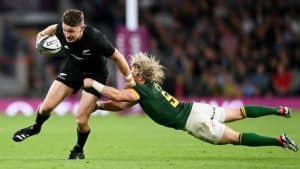Comments by Mark Robinson come ahead of men’s World Cup in France
Rugby union needs to be quicker and more exciting if it is to win over younger fans and build an audience in new markets, according to the chief executive of New Zealand Rugby.
Speaking ahead of the sport’s men’s World Cup, which kicks off next week in France, Mark Robinson said that the global battle for eyeballs meant that the sport needed a greater focus on entertainment if it was to grow beyond its current loyal fan base.
“We’ve all acknowledged that we have to work harder on the shape of the game on the field,” said Robinson, a former professional player. “Especially in new markets and to a younger generation, the game’s got to have a greater tempo, it’s got to have as many spectacular moments in the game as possible.”
Robinson’s concerns reflect feelings shared widely in global sports and media industries that younger people are losing interest. Recent research from polling company YouGov showed that three-quarters of sports fans aged over 55 watched live matches on TV, but that number dropped to just 31 per cent for those under 24. Young people are far more likely to engage via social media or video games.
In response, some sports are turning to condensed formats — such as short-form cricket — or entirely new concepts, such as a Tiger Woods-led effort to have top golfers compete on a simulator. Others are hoping that fly-on-the-wall documentaries will help boost interest through storytelling, as Drive to Survive did with Formula One.
For rugby union, changes to the way games are officiated — such as cutting the time it takes to set the line-outs and scrums that are frequently used to restart play — are among the steps being explored to help make the game more enticing for new fans. Officials have also considered faster or reduced use of video refereeing.

“We’ve got to think of ways we can work with referees, and national unions, and coaches and players,” said Robinson, who has been in post since the start of 2020. “This is not a responsibility that sits with one part of the game — it’s a group approach to find a way for the product to be improved.”
The World Cup comes at a time when the sport faces serious questions about its long-term future. Parts of the professional game are under severe financial pressure. Evidence of the link between playing rugby and severe neurological impairment has led a large number of ex-professionals to launch legal action against the sport’s governing bodies.
Beyond the immediate performance concerns of the All Blacks in France, Robinson and New Zealand Rugby (NZR) face myriad long-term challenges on home soil.
A scathing independent review of the organisation published on Thursday said the country’s domestic competitions were financially unsustainable and that spectator and player numbers were in decline. It also found Māori and people of Pacific island origin remained under-represented in leadership positions despite dominating many areas of the game.
NZR chair Patsy Reddy said in response the board was “committed to considering all recommendations”.
Robinson hopes stakeholders across international rugby will come together to help address some of the issues facing the game, such as by agreeing a unified schedule for competitions.
“We want to create a global calendar and global competitions that have a stronger narrative around them,” he said. “We want to create a product on the field that people are more engaged with and find more enjoyable. But it takes time. In a sport like rugby that’s more than 100 years old, the speed of change doesn’t always happen as quickly as we’d like.”
Japan and the US are seen as important potential growth markets for the sport as it looks to grow beyond its longstanding core markets in the UK, France, South Africa and Australasia. The men’s rugby union World Cup will be held in the US in 2031, followed by the women’s tournament in 2033.
Robinson sees New Zealand’s national teams as powerful tools to sell the game in new markets. To help the All Blacks and Black Ferns shore up their finances and build their global fan base, NZR agreed a NZ$200mn ($119mn) investment deal with US private equity firm Silver Lake last year. The deal valued NZR’s commercial operations at NZ$3.5bn and followed a series of investments in other parts of the game by CVC, a rival private equity firm.
The Silver Lake investment also brought to the fore deep divisions between the game’s administrators in New Zealand and the All Blacks’ players. Critics believe the team’s winning record has suffered from intensifying corporate demands on the game.

NZR said it chose Silver Lake as a partner in part because of its experience in the sector. The California-based firm has several other investments in sport, including a stake in City Football Group, parent of English Premier League champions Manchester City, and in New York Knicks owner Madison Square Garden Sports.
“Silver Lake clearly understood our vision of having to grow the game globally, and to do that it’s got to break into new markets that historically it hasn’t had a major role in,” Robinson said. “We think it’s the responsibility of the whole game to be able to embrace new markets — and you can’t do these things on your own.”
As a result of its tie-up with Silver Lake, NZR recently launched NZR+, a streaming platform that offers match highlights and documentaries to fans around the world.
Despite suffering their worst-ever defeat at the hands of reigning champions South Africa last week, New Zealand go into the tournament as slight favourites with bookmakers ahead of host nation France and top-ranked team Ireland.
Robinson believes the heightened level of competition this year provides the perfect showcase for the sport to win over new fans.
“It’s great for the tournament that there’s so much speculation about what might happen,” he said. “It’s exactly what the sport needs — a huge amount of interest and uncertainty around results and outcome. That’s the hope and aspiration of everybody — they want to see great rugby.”
Additional reporting by Edward White and Samuel Agini
Source: Financial Times



